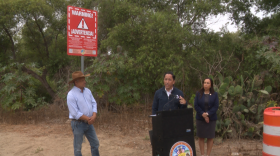Updated August 20, 2025 at 15:06 PM ET
Several Republican-led states are deploying more National Guard troops to Washington, D.C. to address what President Trump has called a "crime emergency" in the nation's capital. Several lawmakers and military officials, including former top official of the National Guard Major Gen. Randy E. Manner, have expressed concern that the guard is being politicized.
"Military vehicles in front of public buildings and the idea of them constantly there with weapons, that is absolutely called intimidation," Manner, who served as acting vice chief of the National Guard Bureau, told Morning Edition. "I'm very concerned about the impact on both our recruiting, as well as, the perception of many of the people of color as they see the National Guardsmen from other states coming in to occupy Washington, D.C."
Despite protests and legal challenges, Trump has repeatedly touted extending federal control over the nation's capital, even though data shared by the Justice Department shows violent crime in the city hit a 30-year low last year.
The republican governors of West Virginia, South Carolina, Mississippi, Louisiana, Ohio, and Tennessee have deployed their National Guard troops to D.C. in recent days. Their reasoning for deployment echo Trump's commentary about crime in D.C., including South Carolina Gov. Henry McMaster, who's said his state's troops are in D.C. to "support President Trump in his mission to restore law and order."
Vermont Gov. Phil Scott, a Republican, notably made it a point to state that he would not send troops into D.C. Scott said deployment would not be an acceptable or appropriate use of them. In the same vein, Democratic Gov. Laura Kelly of Kansas, chair of the Democratic Governors Association, put out a statement urging state leaders to "reject the temptation to use their soldiers to reinforce a dangerous, politically motivated agenda."
Manner, who served the guard for 15 years, says deploying troops into D.C. is a bad idea for several reasons. He notes that the guard is not trained in "policing actions," like the Metropolitan Police and other officers, and their deployment to U.S. streets negatively impacts their readiness to respond to emergencies, like war and natural disasters.
"The sad thing is this is a political prop. Our young soldiers and airmen are political props," Manner said.
Manner spoke with NPR's Michel Martin about what the National Guard is trained to do and why he says deploying troops to D.C. is a law enforcement issue and doesn't meet the criteria for active duty or military operations.
The following interview has been edited for length and clarity.
Interview Highlights
Michel Martin: We asked D.C.'s Joint Task Force last night about the guard's mission, and they told us they support law enforcement in "maintaining order and ensuring that public spaces are safe and well-maintained." So, we've seen National Guard troops brought in in times of civil unrest. We've also seen them support major events like an inauguration. But have you seen anything like this in the past?
Major Gen. Randy E. Manner: This is unprecedented, and it would not meet the criteria for the deployment of National Guardsmen whatsoever. This is absolutely a law enforcement operation in the very best of cases. It is not a military operation. It does not require National Guardsmen or active duty military. And no matter what anyone says, this does not meet the criteria. I've never seen anything like this in my 36 years of service.
Martin: What concerns you most about how the National Guard troops will be utilized in D.C.? I guess what informs your view of this?
Manner: Some of the other speakers talked about the fact that our National Guard is not trained in policing actions. This is not what they do. They are predominantly in support operations. And so that's the first and most important thing. They don't have the experience and the training that the Metropolitan Police and other law enforcement agencies have. The second one is that it actually negatively impacts military readiness, because it pulls people, soldiers and airmen, out of their units and reduces their ability for those units to prepare for war, for deployment. The sad thing is this is a political prop. Our young soldiers and airmen are political props [...] it's being done on the backs of our young men and women. When you think about it, many of these young soldiers and airmen actually earn more money in their civilian jobs than they do in the military. So you're having people deployed. Some people are being pulled out of vacation. Some people are being pulled out of college. And here they are moving in for no legitimate reason.
Martin: Let's take some of these issues sort of one by one. You are part of a group, the bipartisan National Security Leaders for America, that issued a statement saying that the National Guard is stretched nearly to its breaking point. What do you mean by that? I particularly want to hear your concerns about readiness.
Manner: The most important thing that we are here to do is, number one, to be able to serve as the strategic reserve for the United States, for our active duty military forces, for overseas deployments. The National Guard is involved every single day around the world performing missions that are critical to the well-being of the United States. And number two mission is to support the states in terms of natural disasters, such as as we're coming up in hurricane season or forest fires or flooding. We are there to help the American people.
This is actually also changing the entire context of the way that the average citizens in these cities are going to start viewing both our National Guardsmen, our military. If you remember back to 9/11, after that period, we had National Guardsmen in every airport. The objective was to reassure the people that it is safe to fly. And in fact, it actually did that for the many months that they were serving there. This, in contrast, is where we should not have military on our streets, in our American cities. It is absolutely the way that dictatorships run, not democracies.
Martin: When we asked the Joint Task Force about rules of engagement, they said that all service members deployed will get an initial briefing on the mission and operational environment, and that prepares them. Is that enough?
Manner: No, absolutely not. They are called Rules for the Use of Force, and the last one that I actually saw was for 2020 for the D.C. National Guard. Every soldier is supposed to have a plastic card in their pocket that explains exactly what they're supposed to do. And it is drilled into them. It's not supposed to be a one time briefing. This is a very potentially dangerous situation. Again, it's a police action, not a military action.
Treye Green edited to digital piece.
Copyright 2025 NPR







